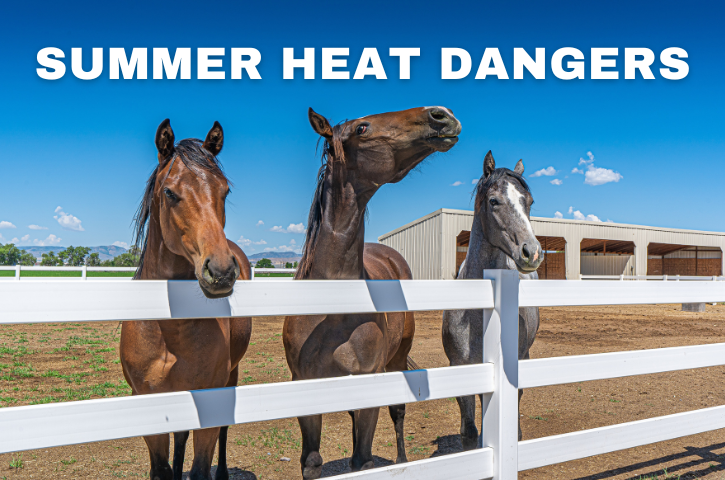Rising temperatures can be tough on your horse. As the summer heats up, it’s essential to understand the dangers of extreme heat and how it can affect your horse’s health. Heat stress and heatstroke are serious medical conditions that can have dangerous consequences if not treated properly. That’s why our vets are here to help!
Here is what you should know about summer heat dangers and what you can do to keep your horse safe.
Understanding Heat Stress and Heatstroke
During the hot summer months, your horse is at increased risk of heat stress and heatstroke. Heat stress occurs when your horse is exposed to extreme temperatures, and they are unable to cool down. If your horse’s condition is not properly treated, it can lead to heatstroke which is life-threatening.
Some of the most common signs of heat stress include:
- Profuse sweating
- Elevated respiratory rate
- Elevated heart rate
- Internal body temperature above 103 F
- Tacky mucous membranes
- Sunken eyes
- Weakness
Horses who progress to heatstroke may experience body temperatures exceeding 106 F, convulsions, and collapse. Unfortunately, this can be fatal, and it’s critical to take steps to cool your horse down at the first signs of overheating.
The Role of Humidity
In addition to high summer temperatures, humidity can play a significant role in your horse’s risk of heat stress or stroke. When your horse sweats, the water evaporates off their body and creates a cooling effect. When the humidity is high, it’s more difficult for this evaporation to occur and your horse to cool down.
Because of this, it’s essential to consider the humidity when evaluating your horse’s heat risk. Avoid riding when the combined temperature and humidity level exceed 150. Additionally, if you are traveling to a more humid climate, remember that it can take several weeks for your horse to acclimate to their new conditions.
Keeping Your Horse Safe
Summer heat can be challenging to avoid. However, there are a few things you can do to help keep your horse safe. The first and most important step you can take is to reduce your horse’s exposure to extreme temperatures. Avoid strenuous rides during the hottest parts of the day, and make sure your horse has access to shade. You can also hose your horse down with cool water to help lower their body temperature and provide some welcomed relief from the heat.
If your horse spends their time in a barn, ensure there is appropriate ventilation to keep them cool and they have plenty of access to fresh water. Horses can lose a significant amount of water through their sweat, so it’s important to keep your horse hydrated and closely monitor their water intake.
Even when taking all of these precautions, the heat can be hard on our equine companions. critical to keep a close eye on their health. If you feel your horse is struggling, please give us a call so we can evaluate their condition and get them the help they need.
Final Thoughts
Rising temperatures can pose a significant risk to your horse’s health, and it’s important to be proactive in keeping your horse safe.
If you have additional questions about your horse’s health or what precautions you should take, please call us. We are happy to discuss your concerns and make recommendations based on your horse’s unique needs.
We look forward to hearing from you and hope you and your horse stay cool this season!
Image credit: Pexels



